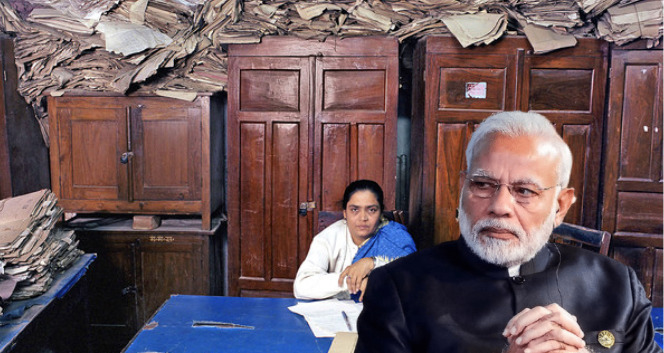- One of the major reasons behind delays in the decision-making of the government is that the files pass to multiple channels of authority to get maximum people on board.
- The government has decided that the bureaucrats can submit e files to each other and, no person will submit the file within the same level of hierarchy.
- The Modi government in a bid to ensure maximum efficiency in the bureaucratic setup has instilled the fear of losing jobs.
Taking another step to end the bureaucratic lethargy and inefficiency, the Modi government decided that no central government file will pass more than four hands before a decision and ministries will also be able to submit e-files to each other, from next month.
One of the major reasons behind delays in the decision-making of the government is that the files pass to multiple channels of authority to get maximum people on board. Sometimes files pass to 6 to 12 channels before a final decision is taken on them. The bureaucrats do this to minimize their responsibility for any resolution. However, this delays the decisions, sometimes no decision is reached, and no single person takes the responsibility or can be held accountable if something goes wrong.
“The tendency has always been in bureaucracy to push the file upwards to get more people on board. This delays decision-making,” said a bureaucrat as per a report by News18.
Also, the government has decided that the bureaucrats can submit e files to each other and, no person will submit the file within the same level of hierarchy. The four levels identified for the channel of submission are secretary, additional secretary or joint secretary, director or deputy secretary, or undersecretary.
This decision will have a far-reaching impact because the time frame to make decisions would be reduced significantly and, the issue of accountability will be fixed.
The Indian bureaucracy, at all levels – the centre, the state, as well as the local level is the best example of how to not manage the workforce of more than ten million people. The total government expenditure in India is more than 60 lakh crore rupees and given our competency in information technology and public digital platforms, every person can have the access to basic amenities. But the inefficient bureaucracy ensures that India remains a poorly managed country.
However, the holistic approach adopted by the Modi government by engaging with professionals would probably solve the HR issues, and if it is successful, it will trickle down to the states as well.
The Modi government in a bid to ensure maximum efficiency in the bureaucratic setup has instilled the fear of losing jobs.
More often than not, government jobs and job security are used as interchangeable terms, however, with no fear of losing the job, an individual or a bureaucrat with age becomes sloppier and laxer in his/her attitude. To nip this menace in the bud, the Modi government has installed a strict reviewing mechanism. If any bureaucrat fails to reach the requisite level of excellence then that bureaucrat is gently shown the doors.
As reported by TFI, between July 2014 and May 2019, 312 bureaucrats in the government were compulsorily retired or were recommended for retirement. The officials were retired on various charges, ranging from corruption to inefficiency. For this purpose, the service records of 36,756 Group-A and 82,654 Group-B officers were reviewed under service rules. Such steps have instilled a valid fear among bureaucrats who perform inefficiently or engage in corruption.
PM Modi has always laid stress on bureaucratic reforms and efficiency in governance as well as policy-making. The aforementioned moves only demonstrate how the Modi government is living up to its promises. Through the later door entry scheme, anyone can now be a top bureaucrat on basis of competence without climbing the ladders of bureaucracy. The latest step would make the managers of the government more responsible, accountable, and efficient.
